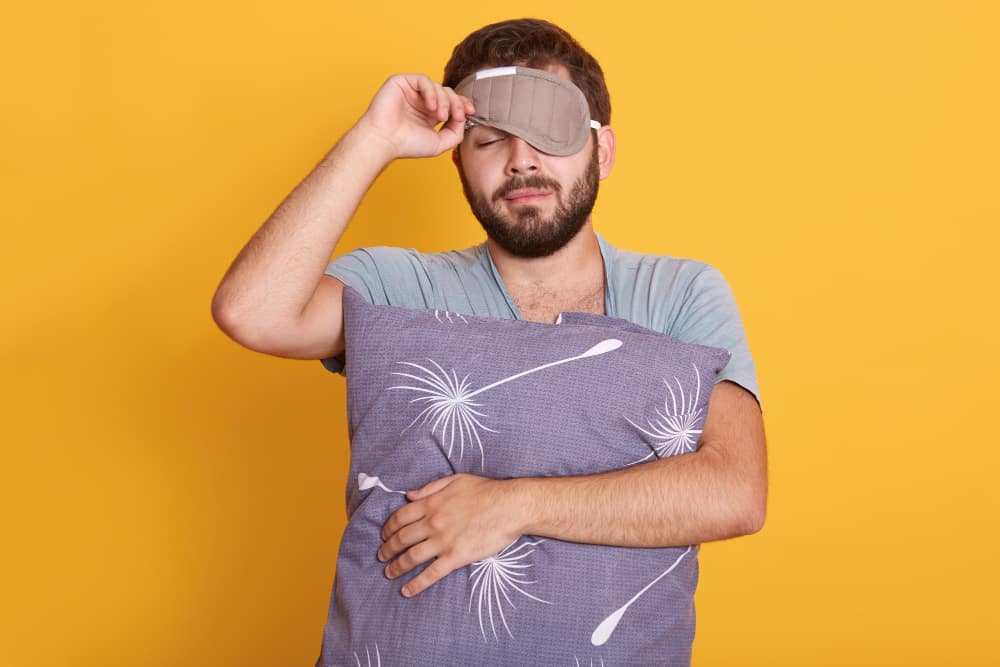Getting a good night’s sleep is essential for your health and well-being. However, oftentimes it can be tough to get the quality sleep you need if you have sleep disorders, have an active lifestyle, or have neglected certain sleep habits such as your routine or diet.

There are many reasons you are struggling with getting quality a g good night’s rest, but luckily, there are some simple steps you can take to improve the quality of your sleep.
Here are our 9 tips for better quality sleep!
Why Is Sleep Important For Your Health?
Before we get into how to get better sleep, let’s first discuss why sleep is so important. Sleep is crucial for our health and well-being because it allows our bodies to rest and repair. When we are asleep, our bodies are able to heal from the damage we’ve done during the day and prepare us for the next day.
Not getting enough quality sleep can lead to a number of health problems such as:
- Obesity
- Diabetes
- Heart disease
- High blood pressure
- Stroke
- Memory problems
- Mood swings
Getting quality sleep is essential for our mental health and even preventing health complications in our later years. Neglecting sleep quality can have detrimental effects, which is why it Is so important to achieve an optimal level of well-being.
9 Tips For Better Quality Sleep!
Exercise Regularly
One of the best ways to improve your sleep quality is to exercise regularly. Exercise helps to promote better sleep by helping to regulate your body’s natural sleep-wake cycle. In addition, exercise can also help to reduce stress and anxiety levels, which can further improve sleep quality.
However, avoid exercising too late at night as this can have the opposite effect and make it harder to fall asleep.
Stick to a Sleep Schedule
Part of getting quality sleep is having a regular sleep schedule. This means going to bed and waking up at the same time each day, even on weekends or days off. Having a regular sleep schedule helps to train your body to fall asleep and wake up at specific times, making it easier for you to get the rest you need.
Here is a more in-depth article on how you can fix your sleep schedule if this is an area you are struggling with!
Avoid Taking Naps During The Day
While napping can be beneficial, it’s important to avoid taking too many naps during the day. Naps are a great way to catch up on some extra rest, but if you take too many naps or nap for too long, they can interfere with your regular sleep schedule and make it harder to fall asleep at night.
Limit The Amount Of Caffeine You Consume
Caffeine is a stimulant that is commonly found in coffee, soda, energy drinks, and even some foods. While caffeine can help to keep you awake throughout the day, consuming too much caffeine can also make it tough for you to fall asleep at night. To improve your quality of sleep, limit your intake of any caffeinated beverages or foods too early in the day.
Eat Healthier Foods
What you eat can also play a role in your sleep quality. Eating healthy foods during the day can help to improve your energy levels and promote better sleep at night. On the other hand, eating heavy or greasy foods can make it harder for you to fall asleep and can also lead to disruptive night-time trips to the bathroom.
Create A Relaxing Bedtime Routine
Having a relaxing bedtime routine is another great way to improve your quality of sleep. This could involve taking a hot bath, reading a book, or doing some light stretching before bed. Doing these activities can help signal to your body that it’s time to wind down for the night and prepare for sleep.
Avoid Electronics Before Bed
It’s also important to avoid using electronics like smartphones, tablets, or TVs before bed. The blue light from these devices can disrupt your body’s natural sleep cycle and make it harder for you to fall asleep at night. By limiting the time you spend on your phone or watching TV before bed, you can help improve your quality of sleep by giving yourself more time to relax and wind down for the night.
Avoid Drinking Too Much Alchohol
While alcohol can make you feel sleepy, it can actually disrupt your sleep and lead to poorer quality sleep. Alcohol prevents you from reaching the deepest stages of sleep, which can leave you feeling groggy and unrested in the morning. If you do drink, avoid doing so too close to bedtime to help improve your quality of sleep.
Invest In a Quality Mattress
Finally, it’s important to make sure that you have a quality mattress and pillow that provide the right support for your body. A comfortable mattress can help improve your quality of sleep by reducing tossing and turning throughout the night. In addition, a good pillow can help to reduce neck and back pain, which can further improve your sleep quality.
Over time, mattresses lose their integrity and the ability to provide your body with the comfort and support it needs for a good night’s sleep. If your experiencing back pain or aches the next morning, then these can be clear indicators that its time for a new bed. There are many great mattresses you can order online if you are long overdue. Also, consider quality memory foam mattresses, as they offer their own unique benefits for those who are desiring more health benefits from their mattress.
Conclusion
With these simple tips, you can start getting the quality sleep that you need and deserve! By making a few changes to your lifestyle, diet, and bedtime routine, you can say goodbye to sleepless nights and start waking up feeling refreshed and energized. And remember, if you’re still struggling with poor sleep quality after trying some of these tips, it’s important to consult your doctor or a medical professional for further advice.
Do you struggle with getting quality sleep at night? What steps have you taken to improve your sleep quality? Share your thoughts in the comments below!








